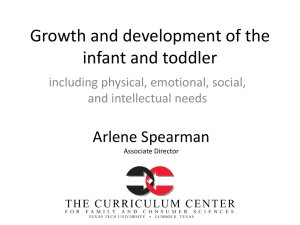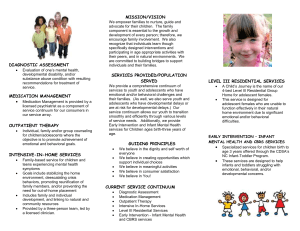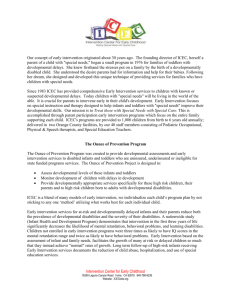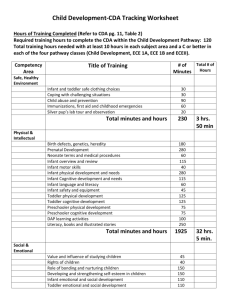An Act Concerning Referrals from the Department of - CT-AIMH
advertisement
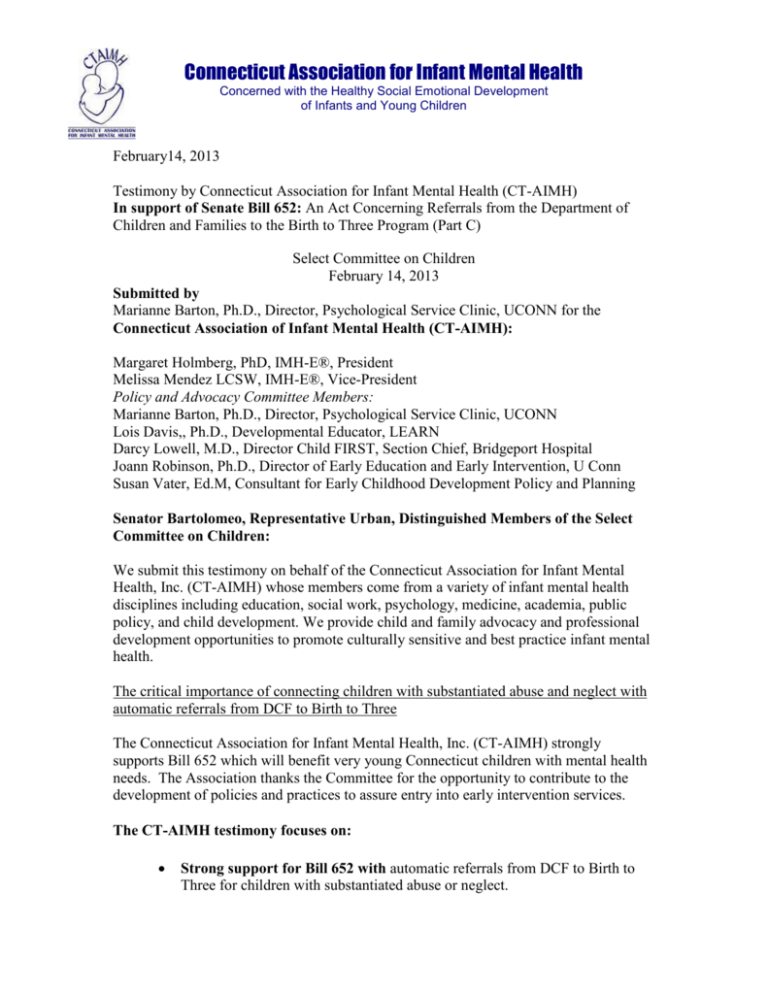
Connecticut Association for Infant Mental Health Concerned with the Healthy Social Emotional Development of Infants and Young Children February14, 2013 Testimony by Connecticut Association for Infant Mental Health (CT-AIMH) In support of Senate Bill 652: An Act Concerning Referrals from the Department of Children and Families to the Birth to Three Program (Part C) Select Committee on Children February 14, 2013 Submitted by Marianne Barton, Ph.D., Director, Psychological Service Clinic, UCONN for the Connecticut Association of Infant Mental Health (CT-AIMH): Margaret Holmberg, PhD, IMH-E®, President Melissa Mendez LCSW, IMH-E®, Vice-President Policy and Advocacy Committee Members: Marianne Barton, Ph.D., Director, Psychological Service Clinic, UCONN Lois Davis,, Ph.D., Developmental Educator, LEARN Darcy Lowell, M.D., Director Child FIRST, Section Chief, Bridgeport Hospital Joann Robinson, Ph.D., Director of Early Education and Early Intervention, U Conn Susan Vater, Ed.M, Consultant for Early Childhood Development Policy and Planning Senator Bartolomeo, Representative Urban, Distinguished Members of the Select Committee on Children: We submit this testimony on behalf of the Connecticut Association for Infant Mental Health, Inc. (CT-AIMH) whose members come from a variety of infant mental health disciplines including education, social work, psychology, medicine, academia, public policy, and child development. We provide child and family advocacy and professional development opportunities to promote culturally sensitive and best practice infant mental health. The critical importance of connecting children with substantiated abuse and neglect with automatic referrals from DCF to Birth to Three The Connecticut Association for Infant Mental Health, Inc. (CT-AIMH) strongly supports Bill 652 which will benefit very young Connecticut children with mental health needs. The Association thanks the Committee for the opportunity to contribute to the development of policies and practices to assure entry into early intervention services. The CT-AIMH testimony focuses on: Strong support for Bill 652 with automatic referrals from DCF to Birth to Three for children with substantiated abuse or neglect. The critical importance of enhanced workforce training and competency in the unique knowledge and practice skills required for working with infants and toddlers and their families with mental health concerns. Inclusion in the Bill formal screening by DCF workers to include development and mental health Inclusion in the Bill comprehensive B-3 developmental assessment that includes evaluation of infant and toddler mental health Inclusion in the Bill, a formal pathway to services for those children found ineligible for B-3 but with developmental and mental health needs. Why is it important that there be automatic referrals from DCF to Birth to Three for those children with substantiated abuse or neglect? The Connecticut Association for Infant Mental Health (CT-AIMH) asserts that there is substantial and convincing literature 1showing that children exposed to family and community violence, abuse, neglect, and other compound risk factors are likely to develop social, emotional and behavioral difficulties, along with developmental delays. This often includes children who are English learners, homeless or in protective or foster care. Numerous studies underscore the need for early identification and intervention for these children so that they can thrive and have an opportunity to become healthy, productive adults. Developmental intervention and family support through Birth-3 will contribute greatly to increasing capacities in vulnerable children and lessening the risk of later maladaptive behavior. Without early intervention, children are at extreme risk for further developmental delays and mental health problems. The federal Child Abuse Prevention and Treatment Act (CAPTA) (P.L. 108-36) recognizes the need for early identification and intervention and requires that states maintain effective mechanisms for referring abused and neglected children under age three to early intervention services. We ask you to amend S.B. 652 to Include: 1. Mental health workforce competency requirement: CT-AIMH strongly recommends that Bill 652 include language requiring that B-3 mental health early intervention services be provided by qualified therapists such as those in a mental health agency, treatment using an Evidence-based model, and /or professionals with CT-AIMH Level III Endorsement. , 1 Shonkoff, J. From Neurons to Neighborhoods: The Science of Early Childhood Development, 2000 Those working with children with unresolved trauma have a very hard job. They need to be competent in the knowledge and practice of infant mental health. Young children lack the language skills to comprehend or express the impact of stress. Infants and toddlers require close observation and sensitivity that enable them to elicit contingently responsive caregiving, often metaphorically referred to as “serve and return” caregiving. When those in the infant/toddler workforce including early care and education providers, home visitors, early interventionists, consultants, clinicians and academicians have achieved the essential skills and competencies, they have unique opportunities to support families and to prevent or treat disturbances in relationships. The CT Association for Infant Mental Health is one of 15 states in the US that offers a set of Competency Guidelines® for those working with infants/toddlers and their families. The Competencies focus on theoretical and direct service skills and are specific to levels of work: infant/family associate, infant/family specialist, infant mental health specialist, and infant mental health mentor (higher education, policy, clinical). Achievement of the Competencies is recognized by Endorsement in Culturally Sensitive, RelationshipFocused Practice Promoting Infant Mental Health®. Acquiring these competencies can help the infant/toddler workforce meet the needs of our families of young children at risk. 2. Specific Developmental Assessment language is to assure appropriate evaluation of the mental and behavioral health of children from birth to age three: CT-AIMH strongly recommends the use of validated instruments such as the Brief Infant Toddler Social Emotional Assessment (BITSEA) Scale to evaluate the social/emotional status of very young children. It has been argued that such instruments (wherein above mean scores measure pathology, and below mean scores measure health) are incongruent with Birth-To-Three eligibility regulations. This issue is easily addressed. It is common and acceptable practice in both research and psychometrics to multiply such scores by -1 in order to align them with traditional measures, and permit appropriate interpretation. 3. Routine developmental and mental health screening of children with substantiated abuse or neglect by DCF case workers: CT-AIMH recommends that DCF workers routinely screen children from birth to age three in developmental skill areas as well as in mental health to assure timely identification and referral of children in need of early intervention services using screening measures such as the Ages and Stages Questionnaire (ASQ) and the ASQSocial-Emotional (ASQ-SE). 4. A Data Tracking Mechanisms An effective data tracking mechanism is required to evaluate accurate percentages of children with developmental delays qualifying them for Birth to 3 services, including categories of delays, and specific Birth to 3services, particularly services provided to those children identified as having mental health impairments and other social-emotional delays or concerns. 5. A Specific pathway to service through Connecticut Help Me Grow for those DCF children referred to B-3 and deemed ineligible for services: We strongly urge an amendment to Bill 657 to include a specific plan for a pathway to service for children found ineligible for B-3; that they be referred directly to the Connecticut Child Development Infoline Help Me Grow program (1-800-505-7000) for triage to developmental assessment, developmental/intervention service, and/or ongoing monitoring. Based on research, it is estimated that 10% of 1 to 2 year olds exhibit social-emotional delays; 10-15% of 2-3 year olds exhibit behavioral concerns and exhibit developmental and behavioral concerns. Yet, too many of these children are not connected with needed services because they do not qualify for programs with the strict eligibility criteria of IDEA Part C, Connecticut Birth to Three, and are often lost to follow up. Connecticut Birth to Three eligibility criteria for developmental delay including social and emotional development is defined as being 2 SD (standard deviations) below the mean or close to 40% delay in one developmental area, or 1.5 SD below the mean (25% delay) in two or more areas. In Connecticut, recent data show that more than 40% of children referred to the Birth to Three System were found ineligible for service2. These children most often have mild to moderate developmental delays and behavioral concerns and need timely linkage to other appropriate services, CT-AIMH also supports: Proposed Senate Bill 169 AN ACT CONCERNING THE ASSESSMENT AND DELIVERY OF MENTAL HEALTH SERVICES AND INTERVENTIONS FOR CHILDREN. And Proposed House Bill 5567 AN ACT CONCERNING CHILDREN'S MENTAL HEALTH. We strongly state our strong support for these Bills and recommend including state funded child care programs so that infants and toddlers are included in the population of young children to be screened and served. Please contact us for more information about any of these points. Additional information about the Competencies and Endorsement is available at our web site: www.ctaimh.org Margaret Holmberg: ctaimh@yale.edu: 203-737-6422, 2 Connecticut Department of Developmental Services Birth to Three System, 2008, 2009


